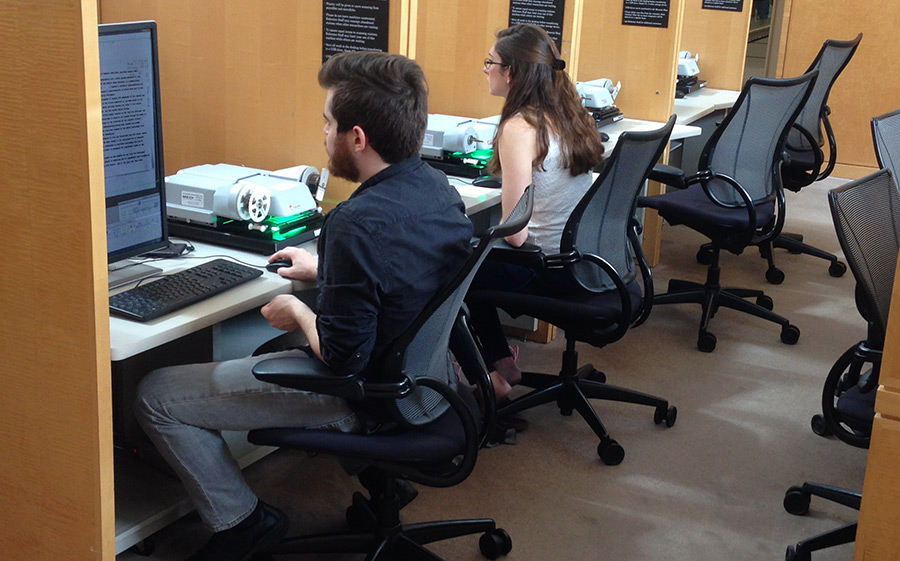BOONE, N.C.—Appalachian State University’s Center for Judaic, Holocaust and Peace Studies and the College of Arts and Sciences program in Judaic, Holocaust and Peace Studies collaborated with four organizations to create a study abroad research trip in Holocaust studies for Appalachian students during their 2017 spring break.
Dr. Thomas Pegelow Kaplan, director of Appalachian’s Center for Judaic, Holocaust, and Peace Studies, teaches the student-driven research course titled The Holocaust: interpretation, memory, and representation. He said the course evolves as the trip progresses with students visiting memorials, studying and discussing their work at research centers in Poland and Germany. “I am very eager to avoid what a number of my colleagues in the field have described as Holocaust tourism,” said Pegelow Kaplan.
The center will provide students with financial support through partnerships with the Rosenblatt Family Foundation, the Miriam and Abe Brenner Foundation, the Greensboro Jewish Federation and the German Academic Exchange Service.
Pegelow Kaplan said his students are working on specific facets of the history of the Holocaust. “Most people would go in the gate of Auschwitz and look at the memorial site, look at the hair and the shoes and feel disturbed. Who wouldn’t be?” His course, Pegelow Kaplan explains, takes a deeper look. “We take a sharp left turn and go into the archive in a barrack and work with the senior research historian on the Auschwitz memorial to research topics the students are developing as we speak.”
Students began preparing for this trip at the start of the spring semester, selecting research topics based on the travel itinerary. Some of the topics focus on the Nazi use of slave labor in places like the late 1930s Volkswagen factory in Wolfsburg, where the students visited Volkswagen’s historical archives.
“When you leave the train station in Wolfsburg, you don’t see the memorial to the murdered slave laborers. You see the glass towers where Volkswagen meets Disneyworld, where you should go and pick up your brand new Volkswagen. The tensions are fascinating,” said Pegelow Kaplan. “The question is how do you deal with the past afterwards. That is why I have invited some politicians and witnesses to dinner. The highest-ranking Christian Democrat, the governing party of Wolfsburg, will meet with us to talk about how the city is dealing with the Nazi past. We want the students to make connections between these tensions and how we talk about the history of slavery in the south.”
One of the goals of the trip and the center is to give students from rural North Carolina more insight into the Holocaust and Jewish life. “In this overall area and part of the country, we have seen an uptick in racism and antisemitism violence,” said Pegelow Kaplan. “In terms of countering this and equipping our students to be able to decide how to deal with and prevent that kind of violence, we need to convey the importance of tackling modern genocide and racial violence.”
In addition to talking about student development, Pegelow Kaplan shared his vision for the center to engage with local communities. “We are working with the Jewish Federation in Greensboro to hopefully bring some of our students there to share their experiences on Yom Hashoa.” The Holocaust Remembrance Day is April 24 this year.
Follow the students’ experience on Instagram @appstatecas through March 21. Documentation of student research will be published on the center’s website: https://holocaust.appstate.edu.
About the Center for Judaic, Holocaust, and Peace Studies
Appalachian State University’s Center for Judaic, Holocaust and Peace Studies was founded in 2002 to develop new educational opportunities for students, teachers and the community. Located administratively within the College of Arts and Sciences, the center seeks to strengthen tolerance, understanding and remembrance by increasing the knowledge of Jewish culture and history, teaching the history and meaning of the Holocaust, and utilizing these experiences to explore peaceful avenues for human improvement and the prevention of further genocides. The Center for Judaic, Holocaust and Peace Studies is an associate institutional member of the Association of Jewish Studies, a member of the Association of Holocaust Organizations and a member of the North Carolina Consortium of Jewish Studies.
About the College of Arts and Sciences
The College of Arts and Sciences is home to 16 academic departments spanning the humanities, social sciences, and the mathematical and natural sciences. The college is dedicated to providing instruction and research essential to the university’s mission and seeks to cultivate the habits of inquiry, learning and service among all its constituents. There are approximately 5,700 student majors. As the college is also largely responsible for implementing Appalachian’s general education curriculum, it is heavily involved in the education of all students at the university, including those pursuing majors in other colleges.
About Appalachian State University
As a premier public institution, Appalachian State University prepares students to lead purposeful lives. App State is one of 17 campuses in the University of North Carolina System, with a national reputation for innovative teaching and opening access to a high-quality, cost-effective education. The university enrolls more than 21,000 students, has a low student-to-faculty ratio and offers more than 150 undergraduate and 80 graduate majors at its Boone and Hickory campuses and through App State Online. Learn more at https://www.appstate.edu.
What do you think?
Share your feedback on this story.




![How NCInnovation Is Rethinking Economic Development in North Carolina [faculty featured]](/_images/_posts/2026/02/rethinking-economic-development-600x400.jpg)







